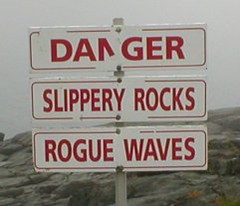How deaf is Deaf enough?
Thanks to Carl who gave me a heads-up to this story about students at Gallaudet University (the "Deaf" university), occupying a building on campus to protest the University's choice of a new President.
Their main bone of contention with incoming President Jane Fernandes? Well, student leaders speaking on the record say she was "appointed without merit" or "has failed to show leadership". These rather mushy reasons may or may not hide another reason - unhappiness with the fact that Fernandes was "mainstreamed" in school, and only learned ASL later in life.
To those who know a little about Deaf* history and culture there's a little deja-vu-all-over-again about this. The famous (or notorious) "DPN" ("Deaf President Now") protests of 1988 broke out when a hearing candidate was chosen as Gallaudet President over, it was probably fairly felt, at least one strong Deaf contender. It is frequently referred to as the "Deaf Stonewall" - the point-of-no-return moment when Gallaudet's Deaf - indeed, many more deaf and Deaf - were no longer willing to be led exclusively by the hearing.
I admire those who led the DPN protests. Deaf education and culture - and if not at Gallaudet, for heaven's sake, where? - had matured to the point where the leadership was there, was ready, and a hearing President was no longer the right option for Gallaudet. Not if there was a qualified D/deaf candidate.
So what about this protest? I have mixed emotions. There is, let there be no doubt, a thick black line drawn between the deaf, and especially the Deaf, and the deafened - people like myself who were born hearing and went deaf. That can take the form of exclusion or condescension. Don't get me wrong - Deaf people have been some of the kindest and most helpful people in my life since I lost my hearing. My ASL instructor is D/deaf. But it was perfectly clear to me that my deaf status would always be inferior to culturally Deaf peoples' Deaf status. I would never be truly Deaf, would never speak ASL like a native.
That's fine, for me. I dont want to be Deaf and couldn't be if I wanted to, any more than moving to Mumbai tomorrow would make me an Indian. I'm a deafened hearing person and a deaf person. But where does it leave people like Jane Fernandes, who apparently is deaf - but not Deaf enough, due to her mainstream schooling and her learning of English as her first language and ASL as her second?
Is it reasonable for the student body of Gallaudet - composed almost entirely of people who identify as proudly Deaf - to expect their President to have experience the world primarily through their own first language and their own culture?
Or is it elitism and exclusionism?
ronnie
*It is a convention to use the capital D when referring to Deaf culture among those who recognize Deafness as a full and complete culture with a shared language, history and identity. Use of the small-d refers to the physical condition of being unable to hear.
Labels: deafness



1 Comments:
Hey Ronnie,
I have no idea where I stand on this, since I don't have any real experience in the Deaf world. One thing that stuck out in the articles I've read, however, was a remark by a few Deaf students that they were concerned by trends among parents to "fix" their hearing-impaired children by giving them cochlear implants as early as they could. Deaf kids sound like they're worried about having deafness be treated like a disease, something to eradicate, something that might merit terminating a fetus someday if you could detect it early. Deaf people might not have the "choice" to live in a non-hearing environment if they're raised to be as much like hearing people as possible from an early age; moreover, what happens to the few people who do identify as Deaf? Will they be stigmatized because there was something "wrong" that they didn't choose to cure?
I don't know what *to* think about that, but I just keeping thinking about it.
Post a Comment
Subscribe to Post Comments [Atom]
<< Home